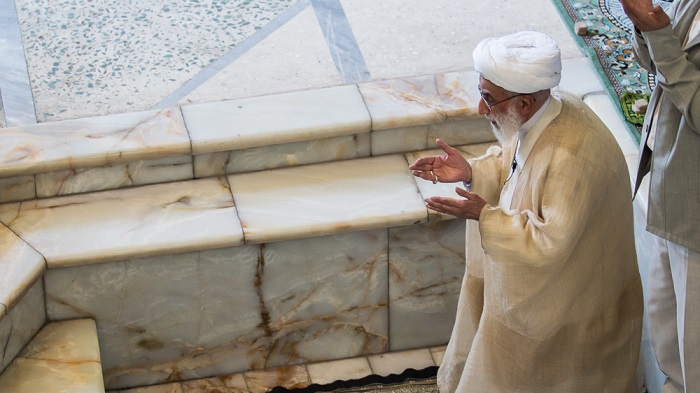Friday Prayers across Iran: Mina stampede and FATF

(Ahmad Jannati performing the Friday prayers. Source: Arash Mirsepasi/YJC)
One week before the first anniversary of Mena Stampede, sermonizers across Iran were expectedly acid-tongued against the Saudi Household, not only for its clumsy handling of the hajj ritual, which last year led to death of more than 2000 pilgrims, among them 464 Iranians, but also for its regional policies.
In Qom, center of Iran's Shia seminaries, Ayatollah A'rafi called Al Saud, the Saudi royal house, "generators of terrorist ideas and a mercenary of Imperialism". A'rafai slammed the Saudi Household and "the court's muftis" for their incapacity in administering the "Two Holy Shrines", that is, the holy sites of Mecca and Medina. In Arak, central Iran, former intelligence minister Ghorban-Ali Dorri Najafabadi called the Saudi house an "evil progeny", echoing Ayatollah Khamenei's recent letter addressing the Muslim World. Najafabadi also reminded the congregation of Saudis' "crimes in the region", referring to Riyadh's unfortunate interventions in Yemen, Iraq, Syria, Bahrain, and Lebanon. Arak's Friday prayers' leader also complained that Saudi petrodollars has silenced international organizations about the Mena incident.
In Sanandaj, center of the Sunni-dominated Kurdistan Province, Mamosta Seyyed Ahsan Hosseini, Friday prayers' leader of the city, called the Saudi family "servants of the enemies of Islam", slamming Riyadh for 'slaughtering' Muslims by weapons bought from Western countries. Meanwhile in Boroujerd, west of Iran, this week's sermonizer of the city's Friday prayers Hassan Torabi blamed Saudi Arabia, along with the United States and Britain, for takfiri groups' bloodshed across the Muslim World.
Controversy over Hassan Rouhani administration's agreement with FATF to comply with a number of the anti-money laundery institute's rules and regulations spilled into Friday prayers' speeches this week. In Tehran, Ahmad Jannati, head of the Guardian Council and a quintessential hardliner, who was performing as Friday prayers' leader after a relatively long absence, slammed the decision. "How did they dare to sign this confidential agreement?" he said, speaking of Rouhani's top banking officials, head of Central Ban Valiollah Seif and Minister of Economy Ali Tayebnia. "They want to deliver our financial and banking intelligence to the enemy under the excuse of fighting money laundry" he claimed. "They want us to impose sanction on ourselves." Jannati asked the parliament to raise its voice against the agreement and use its discretion to block the decision. He also expressed concern that with Iran joining the FATF, "revolutionary institutes" including IRGC would be sanctioned inside the country.
In Qazvin, northwest of Tehran, Abdolkarim Abedini, a persistent critic of Hassan Rouhani's policies, particularly the JCPOA, argued that the agreement with FATF "will bring nothing but reinforcement of sanctions and infighting." Abedini repeated the common line of argument against Iran's compliance with FATF regulations: that it is tantamount to "self-sanctioning" and "undermin[es] powerful institutes inside the country." Qazvin's Friday prayers' sermonizer likened FATF to his favorite subject of criticism, the nuclear deal, which also "had no achievements for the country and was planned to weaken the establishment." In Qom, Friday prayers' leader Ayatollah A'rafi also expressed concern about FATF, calling for diligence in complying with its regulations. "The Islamic Resistance is more important than anything else" he said. "We should not be negligent about that."
IRD/66

